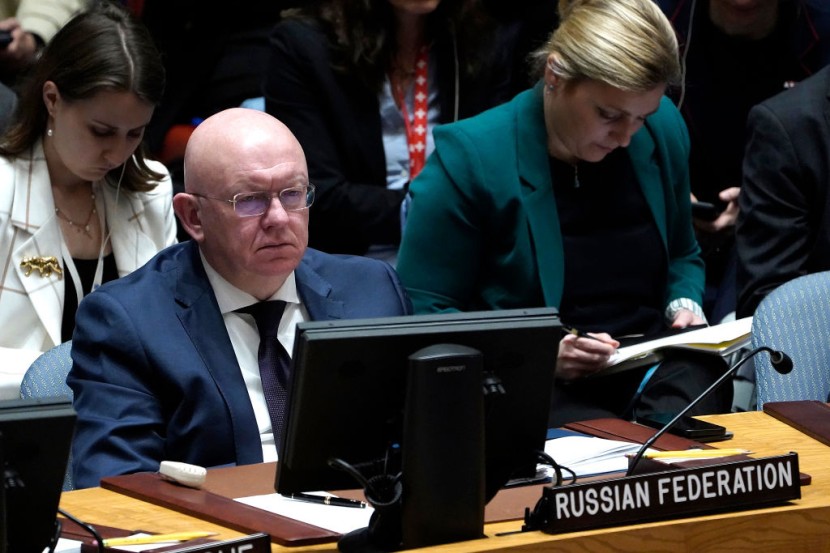Russia and China exercised their veto power on Wednesday, blocking a United States initiative at the United Nations Security Council.
The proposal aimed to address the ongoing Israel-Hamas conflict by urging temporary ceasefires to facilitate the delivery of humanitarian aid, protect civilians, and halt the arming of Hamas and other militant groups in the Gaza Strip, as per Reuters.
UN Security Council Over Gaza Conflict

The United States found itself at the center of global attention as it put forward a draft resolution at the United Nations Security Council. This move came only days after the US had vetoed a humanitarian-focused resolution from Brazil, citing the need for more time for US-led diplomatic efforts.
The situation raised concerns, especially given the initial bluntness of the US text, which unequivocally affirmed Israel's right to defend itself and demanded that Iran cease exporting arms to militant groups. Notably, the initial text did not include provisions for humanitarian pauses for aid access, which generated significant diplomatic shockwaves.
The double veto by Russia and China on the US resolution represented a rare and unexpected development. Historically, the United States has been known to shield its ally, Israel, within the United Nations framework. However, the gravity of the crisis in Gaza prompted the US to advocate for Security Council action.
Linda Thomas-Greenfield, the US Ambassador to the UN, acknowledged the disappointing outcome of the vote, adding, "Though today's vote was a setback, we must not be deterred."
The vote saw ten member states support the US text, while the United Arab Emirates voted against it, and Brazil and Mozambique abstained. The response to the US resolution was mixed. China's UN Ambassador, Zhang Jun, criticized the draft, claiming it did not align with the global call for a ceasefire and an end to the fighting.
He emphasized that, at this moment, a truce was not merely a diplomatic term but a matter of life and death for countless civilians. UN Secretary-General Antonio Guterres also urged a humanitarian ceasefire, underscoring the pressing need for diplomatic efforts to halt the hostilities.
With the Security Council facing a deadlock following the double veto, the focus shifted to the 193-member UN General Assembly. On the horizon was a vote on a draft resolution submitted by Arab states, which called for a ceasefire.
Unlike the Security Council, the General Assembly does not have member states with veto power. Although resolutions passed in the General Assembly are non-binding, they carry substantial political weight, according to NDTV.
Israel's Pledge Amid Rising Casualties
The situation in Gaza had reached a critical point. Israel had pledged to eliminate Hamas, the ruling authority in Gaza, in retaliation for an attack on October 7 that claimed the lives of 1,400 people.
Israel had taken aerial strikes, imposed a siege on the enclave, and was preparing for a ground invasion. According to Palestinian authorities, more than 6,500 individuals have lost their lives.
Russia's UN Ambassador, Vassily Nebenzia, criticized the US for introducing a draft resolution that effectively authorized a ground offensive by Israel in Gaza, arguing that it would result in the deaths of numerous Palestinian children. Following the double veto, the Security Council voted on an alternative resolution drafted by Russia.
This resolution called for a humanitarian ceasefire and the withdrawal of Israel's order for civilians in Gaza to relocate south in anticipation of a ground assault. Fortunately, the Russian resolution encountered a major setback, as it only received four votes.
For a solution to be passed, it must receive a minimum of nine votes and avoid any vetoes from the Security Council's permanent members, namely the United States, France, Britain, Russia, and China. This marked Russia's second attempt at passing a resolution related to the Gaza crisis, with the previous effort receiving support from just five council members on October 16.
In response to the impasse at the Security Council, the ten elected members began discussing a new draft resolution. Malta's UN Ambassador, Vanessa Frazier, emphasized the growing risk of a regional spillover and called for the world's undivided attention, highlighting the duty and obligation to take action.
The crisis in Gaza has become a flashpoint on the international stage, with the United States facing the challenging task of balancing its support for Israel with growing global demands for a ceasefire and humanitarian relief in the conflict-ravaged region. As the situation unfolds, the world watches with bated breath, hoping for a resolution to end the suffering of the people of Gaza, The Washington Post reported.








